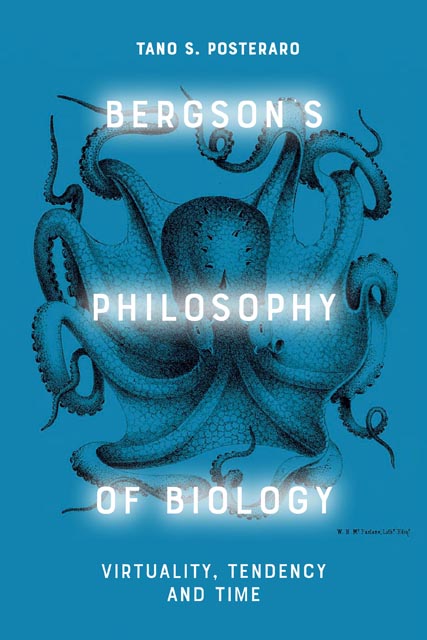Book contents
- Frontmatter
- Contents
- Acknowledgements
- Abbreviations
- Introduction: Between Philosophy and Biology
- 1 The Actual: Mechanism, Finalism, Modality
- 2 The Virtual: Instantiation, Implication, Dynamics
- 3 A Discourse on Tendency
- 4 Individuality and Organisation
- 5 Finalism Inverted
- 6 Canalisation and Convergence
- Concluding Remarks and Future Directions
- Notes
- Bibliography
- Index
2 - The Virtual: Instantiation, Implication, Dynamics
Published online by Cambridge University Press: 25 October 2023
- Frontmatter
- Contents
- Acknowledgements
- Abbreviations
- Introduction: Between Philosophy and Biology
- 1 The Actual: Mechanism, Finalism, Modality
- 2 The Virtual: Instantiation, Implication, Dynamics
- 3 A Discourse on Tendency
- 4 Individuality and Organisation
- 5 Finalism Inverted
- 6 Canalisation and Convergence
- Concluding Remarks and Future Directions
- Notes
- Bibliography
- Index
Summary
Bergson theorises a type of existence distinct from actuality and possibility, called virtual. This chapter traces this category through a set of themes in Bergson's philosophy before its employment as the modal designation for the élan vital in Creative Evolution, which I examine in the next chapter. The themes I discuss in this chapter include Bergson’s accounts of perception, behavioural schemata, the past, and intellectual effort. I use them to map a conception of the virtual, pausing to elaborate some consequences for the philosophy of biology as I proceed. The chapter concludes with a global definition of virtuality according to the mereology of instantiation, implication, and dynamic interaction.
Introduction
Bergson's philosophy of biology pivots on a modal category of virtual existence, a type of existence irreducible to the categories of actuality and possibility that I discussed in Chapter 1. The evolution, development, and organisation of living things are patterned by tendencies. Tendencies are not manifest all at once, in actuality, and neither can their trajectories be articulated in advance, like possibilities. Understanding them requires the use of a different philosophical vocabulary, a vocabulary of virtual existence intended to capture the features distinctive of life, such as its temporal dynamism and the interpenetration of parts in an organised whole. This chapter lays the details of that vocabulary out.
Gilles Deleuze was among the first to make much of anything serious of Bergson's talk of virtuality (1991: 96–7; 1994: 201–14; 2006: 51–72, 91–113). Almost all recent work done on the term refers to Deleuze. It is typically taken for granted that Bergson develops something like a theory of virtuality, though there is no consensus on what that theory entails or whether Bergson is consistent in his own employment of it. The four panellists at the Society for Phenomenology and Existential Philosophy's 2017 ‘Bergson Circle’, the topic for which was Matter and Memory, agreed that the text's usage of the term ‘virtual’ is inconsistent, operating on some occasions as a rough equivalent for potentiality, on others as a synonym for dormancy or uselessness, and on others as a specific designation for the reality of the past (Ansell-Pearson et al. 2017). I demonstrate that there is a deeper continuity at work, and that the various senses that Bergson accords to the idea of virtuality throughout Matter and Memory can be brought together.
- Type
- Chapter
- Information
- Bergson's Philosophy of BiologyVirtuality, Tendency and Time, pp. 71 - 103Publisher: Edinburgh University PressPrint publication year: 2022



